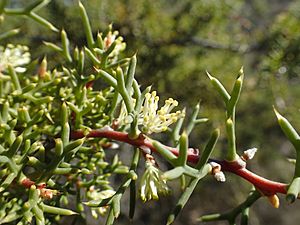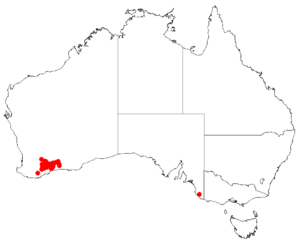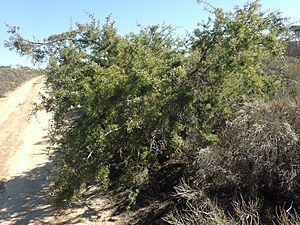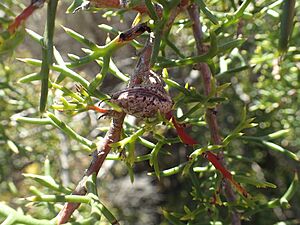Hakea horrida facts for kids
Quick facts for kids Hakea horrida |
|
|---|---|
 |
|
| Flowers and flower buds of Hakea horrida | |
| Scientific classification |
|
| Kingdom: | Plantae |
| Clade: | Tracheophytes |
| Clade: | Angiosperms |
| Clade: | Eudicots |
| Order: | Proteales |
| Family: | Proteaceae |
| Genus: | Hakea |
| Species: |
H. horrida
|
| Binomial name | |
| Hakea horrida R.M.Barker
|
|
 |
|
| Occurrence data from AVH | |
| Script error: The function "autoWithCaption" does not exist. | |
Script error: No such module "Check for conflicting parameters".
Hakea horrida is a very prickly shrub that belongs to the plant family called Proteaceae. It's special because it only grows naturally in certain parts of Western Australia. You can find it in areas like the Wheatbelt, Great Southern, and Goldfields-Esperance regions. This plant is known for being a dense, thorny bush with beautiful, creamy-white flowers that have a lovely scent.

Contents
What Does Hakea horrida Look Like?
This shrub is very branched and can grow to be about 0.6 to 2 meters (2 to 7 feet) tall. It's an incredibly dense and tough plant because its leaves are super prickly. This makes it hard for anything to get through it!
The leaves are stiff and about 4 to 10 centimeters (1.5 to 4 inches) long. They have deep grooves and are narrow, with 5 to 7 sharp, tooth-like points.
Flowers and Fruit
Hakea horrida blooms from August to October. During this time, it produces large, sweet-smelling flowers that are white to cream in color. These flowers grow in groups where the leaves meet the stem. Sometimes, they can form a cluster of up to 22 flowers.
After the flowers, the plant grows smooth or slightly rough fruit. These fruits are shaped like an egg, about 2 centimeters (0.8 inches) long and 1.5 centimeters (0.6 inches) wide. They have two distinct, slightly curved "beaks" at the end.
How Did Hakea horrida Get Its Name?
This plant was officially described by a scientist named Robyn Mary Barker in 1990. Its name, horrida, comes from a Latin word that means "prickly." This name perfectly describes the plant's extremely sharp leaves!
Where Does Hakea horrida Grow?
Hakea horrida can be found growing from Kondinin south to Lake Grace and east to Esperance. It likes to grow in areas with heath and scrubland. You'll often find it in sandy-loam soil that has lateritic gravel.
Is Hakea horrida Endangered?
The good news is that the Western Australian Government has classified Hakea horrida as "not threatened." This means it's not currently in danger of disappearing.
 | Charles R. Drew |
 | Benjamin Banneker |
 | Jane C. Wright |
 | Roger Arliner Young |


